University Case Study: Analyzing Lisa's Mental Health Challenges
VerifiedAdded on 2023/01/19
|10
|3174
|43
Case Study
AI Summary
This case study delves into the mental health challenges faced by Lisa, examining the impact of trauma, substance abuse, and the application of Trauma-Informed Care Principles (TICP). The analysis identifies key issues, including lack of support, medication non-compliance, and substance abuse relapse, and connects them to TICP principles. It emphasizes the importance of collaborative care involving a multidisciplinary team, family members, and the patient. The study also highlights the benefits of a recovery-oriented model and the application of TICP principles to empower Lisa, provide support, and promote safety and awareness. The case study concludes by underscoring the importance of addressing mental health concerns through effective interventions and support systems, with references to relevant research on mental health, trauma, and substance abuse treatment.
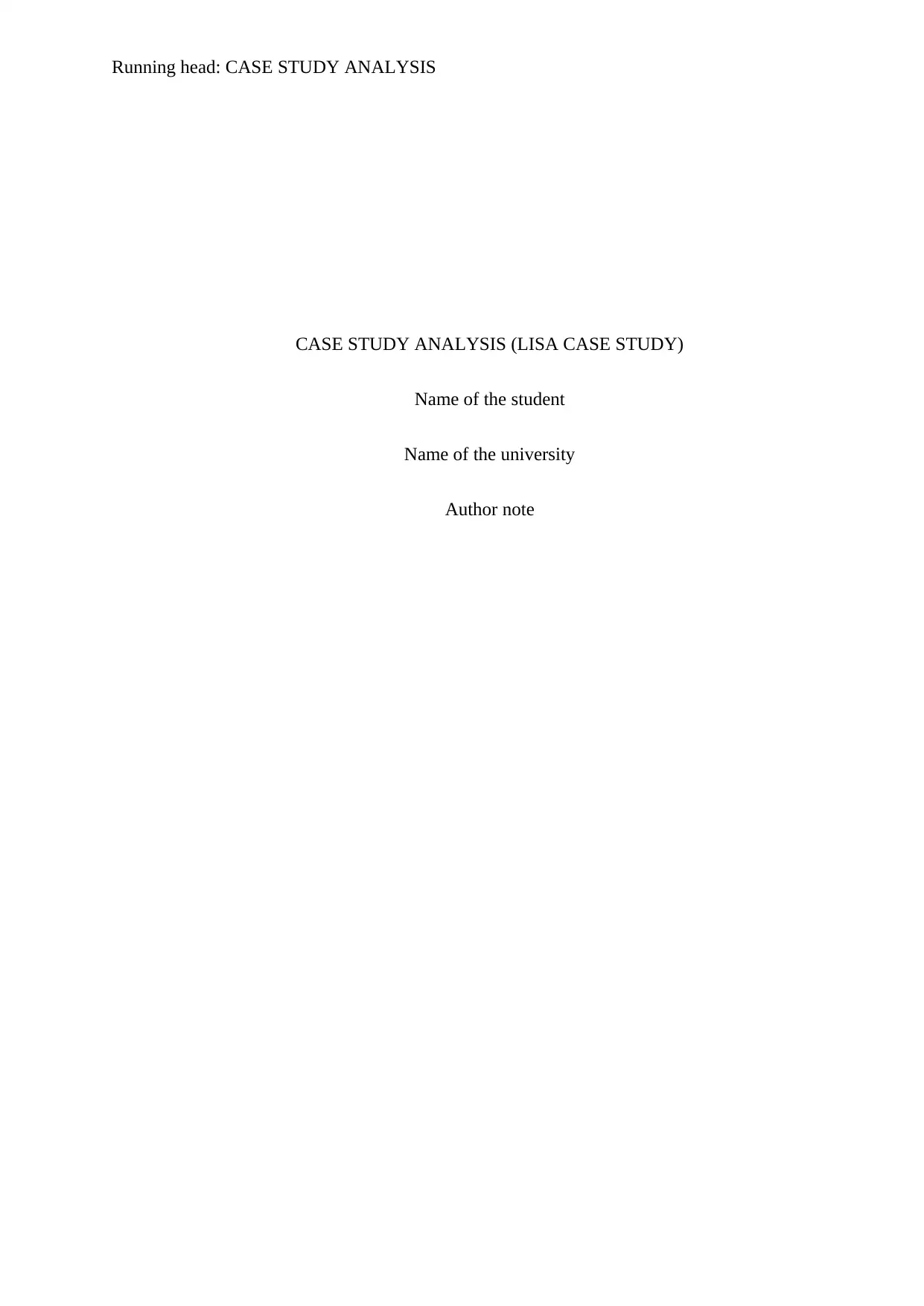
Running head: CASE STUDY ANALYSIS
CASE STUDY ANALYSIS (LISA CASE STUDY)
Name of the student
Name of the university
Author note
CASE STUDY ANALYSIS (LISA CASE STUDY)
Name of the student
Name of the university
Author note
Paraphrase This Document
Need a fresh take? Get an instant paraphrase of this document with our AI Paraphraser
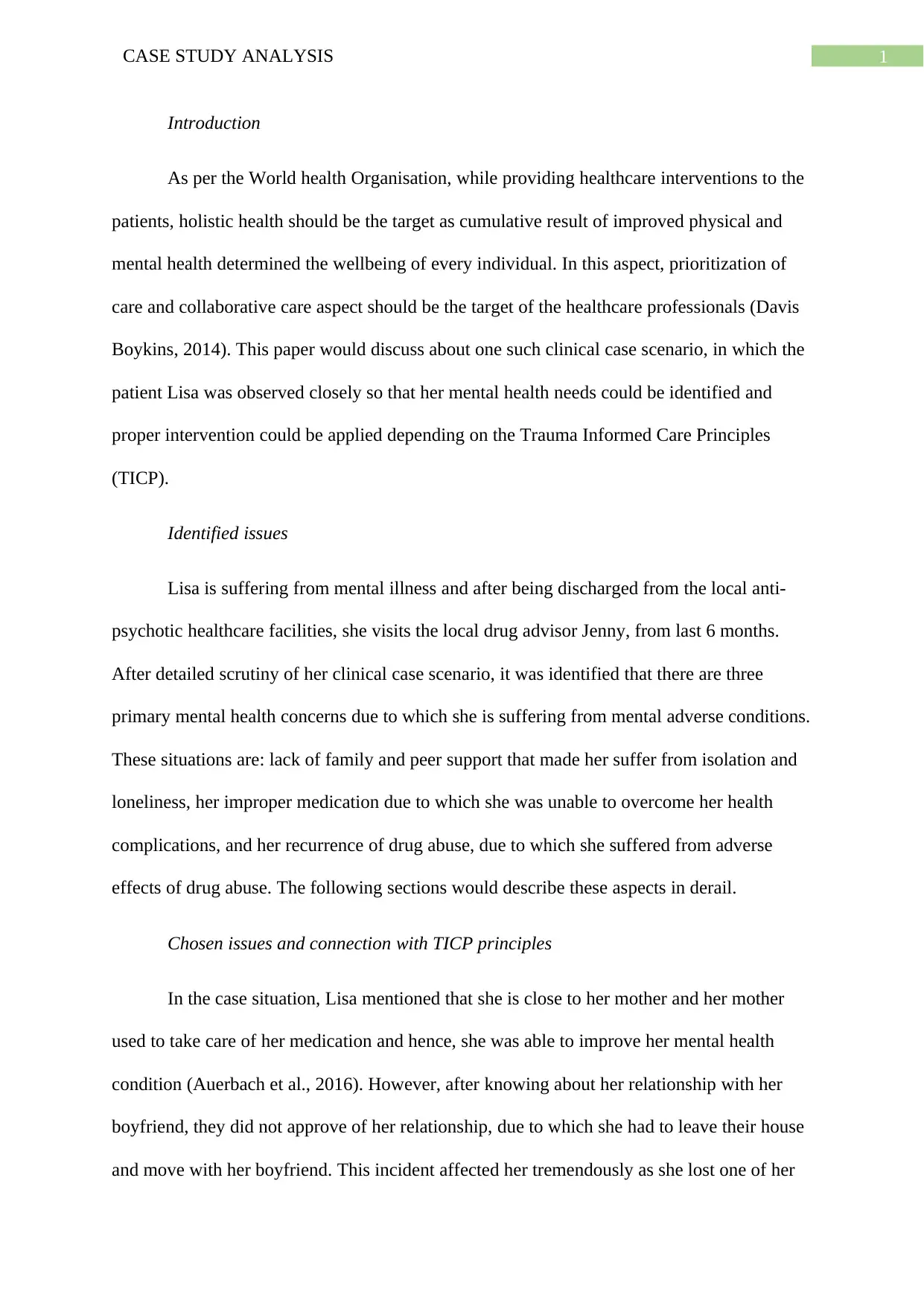
1CASE STUDY ANALYSIS
Introduction
As per the World health Organisation, while providing healthcare interventions to the
patients, holistic health should be the target as cumulative result of improved physical and
mental health determined the wellbeing of every individual. In this aspect, prioritization of
care and collaborative care aspect should be the target of the healthcare professionals (Davis
Boykins, 2014). This paper would discuss about one such clinical case scenario, in which the
patient Lisa was observed closely so that her mental health needs could be identified and
proper intervention could be applied depending on the Trauma Informed Care Principles
(TICP).
Identified issues
Lisa is suffering from mental illness and after being discharged from the local anti-
psychotic healthcare facilities, she visits the local drug advisor Jenny, from last 6 months.
After detailed scrutiny of her clinical case scenario, it was identified that there are three
primary mental health concerns due to which she is suffering from mental adverse conditions.
These situations are: lack of family and peer support that made her suffer from isolation and
loneliness, her improper medication due to which she was unable to overcome her health
complications, and her recurrence of drug abuse, due to which she suffered from adverse
effects of drug abuse. The following sections would describe these aspects in derail.
Chosen issues and connection with TICP principles
In the case situation, Lisa mentioned that she is close to her mother and her mother
used to take care of her medication and hence, she was able to improve her mental health
condition (Auerbach et al., 2016). However, after knowing about her relationship with her
boyfriend, they did not approve of her relationship, due to which she had to leave their house
and move with her boyfriend. This incident affected her tremendously as she lost one of her
Introduction
As per the World health Organisation, while providing healthcare interventions to the
patients, holistic health should be the target as cumulative result of improved physical and
mental health determined the wellbeing of every individual. In this aspect, prioritization of
care and collaborative care aspect should be the target of the healthcare professionals (Davis
Boykins, 2014). This paper would discuss about one such clinical case scenario, in which the
patient Lisa was observed closely so that her mental health needs could be identified and
proper intervention could be applied depending on the Trauma Informed Care Principles
(TICP).
Identified issues
Lisa is suffering from mental illness and after being discharged from the local anti-
psychotic healthcare facilities, she visits the local drug advisor Jenny, from last 6 months.
After detailed scrutiny of her clinical case scenario, it was identified that there are three
primary mental health concerns due to which she is suffering from mental adverse conditions.
These situations are: lack of family and peer support that made her suffer from isolation and
loneliness, her improper medication due to which she was unable to overcome her health
complications, and her recurrence of drug abuse, due to which she suffered from adverse
effects of drug abuse. The following sections would describe these aspects in derail.
Chosen issues and connection with TICP principles
In the case situation, Lisa mentioned that she is close to her mother and her mother
used to take care of her medication and hence, she was able to improve her mental health
condition (Auerbach et al., 2016). However, after knowing about her relationship with her
boyfriend, they did not approve of her relationship, due to which she had to leave their house
and move with her boyfriend. This incident affected her tremendously as she lost one of her

2CASE STUDY ANALYSIS
strongest support, which is her mother. This might be reason of her isolation and loneliness
related condition. Further, as per Hassan et al. (2016), for people affected with mental health
conditions, family support or family centered care is a crucial aspect as with proper support
of family patients are empowered with confidence and dignity and hence, they are able to
improve their health condition. Further, as per Fumagalli et al. (2015), lack of empowerment
and support are primary aspects which affects the patients with resulting anxiety, stress and
violent behaviour. Further, these personality traits repel such patients from their targeted
interventions and increases their risk of substance abuse (Derksen et al., 2017). Similar
condition was observed in the clinical situation of Lisa, as due to the lack of support and
empowerment, she become addicted to drug abuse, and developed adverse emotions.
Therefore, as per TICP developed by the Substance Abuse and Mental Health Services
Administration (SAMHSA), Lisa lacked empowerment and support due to which, she was
unable to overcome her mental healthcare complications. Further, as per the TICP principle,
in the absence of peer support and empowerment from her family members, she developed
critical mental health conditions (SAMHSA, 2019).
The second issue which was identified from the clinical case scenario is associated to
her relapsed cannabis and speed consumption. As per Oshri et al. (2017), substance abuse in
mentally ill patients leads to adverse health conditions due to which they could develop self-
harm or other severe health conditions. In the case study, it was observed that Lisa had a
history of substance abuse and used to smoke cannabis and speed. However, after the regular
and effective care provided in the presence of her mother and regular medication, she was
able to control her addictive habits. Further, she also reduced her rate of cannabis and speed
usage. Despite the fact, after recovering rejection of her family, she was unable to stick to the
medication and hence, her mental health condition worsened (Tyrer, Reed & Crawford,
2015). Further, it was also seen that excessive substance abuse is associated to hallucinations
strongest support, which is her mother. This might be reason of her isolation and loneliness
related condition. Further, as per Hassan et al. (2016), for people affected with mental health
conditions, family support or family centered care is a crucial aspect as with proper support
of family patients are empowered with confidence and dignity and hence, they are able to
improve their health condition. Further, as per Fumagalli et al. (2015), lack of empowerment
and support are primary aspects which affects the patients with resulting anxiety, stress and
violent behaviour. Further, these personality traits repel such patients from their targeted
interventions and increases their risk of substance abuse (Derksen et al., 2017). Similar
condition was observed in the clinical situation of Lisa, as due to the lack of support and
empowerment, she become addicted to drug abuse, and developed adverse emotions.
Therefore, as per TICP developed by the Substance Abuse and Mental Health Services
Administration (SAMHSA), Lisa lacked empowerment and support due to which, she was
unable to overcome her mental healthcare complications. Further, as per the TICP principle,
in the absence of peer support and empowerment from her family members, she developed
critical mental health conditions (SAMHSA, 2019).
The second issue which was identified from the clinical case scenario is associated to
her relapsed cannabis and speed consumption. As per Oshri et al. (2017), substance abuse in
mentally ill patients leads to adverse health conditions due to which they could develop self-
harm or other severe health conditions. In the case study, it was observed that Lisa had a
history of substance abuse and used to smoke cannabis and speed. However, after the regular
and effective care provided in the presence of her mother and regular medication, she was
able to control her addictive habits. Further, she also reduced her rate of cannabis and speed
usage. Despite the fact, after recovering rejection of her family, she was unable to stick to the
medication and hence, her mental health condition worsened (Tyrer, Reed & Crawford,
2015). Further, it was also seen that excessive substance abuse is associated to hallucinations
⊘ This is a preview!⊘
Do you want full access?
Subscribe today to unlock all pages.

Trusted by 1+ million students worldwide
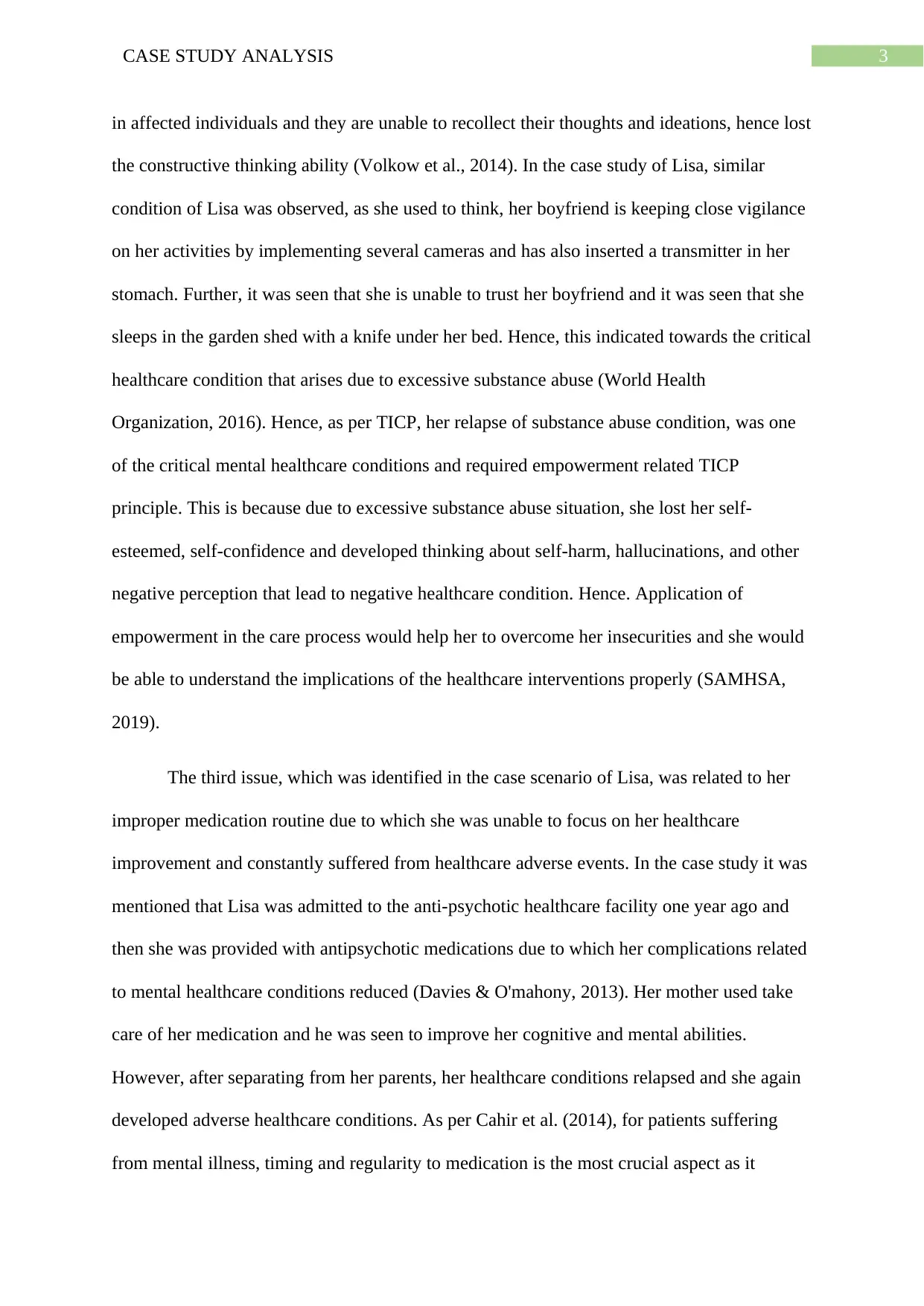
3CASE STUDY ANALYSIS
in affected individuals and they are unable to recollect their thoughts and ideations, hence lost
the constructive thinking ability (Volkow et al., 2014). In the case study of Lisa, similar
condition of Lisa was observed, as she used to think, her boyfriend is keeping close vigilance
on her activities by implementing several cameras and has also inserted a transmitter in her
stomach. Further, it was seen that she is unable to trust her boyfriend and it was seen that she
sleeps in the garden shed with a knife under her bed. Hence, this indicated towards the critical
healthcare condition that arises due to excessive substance abuse (World Health
Organization, 2016). Hence, as per TICP, her relapse of substance abuse condition, was one
of the critical mental healthcare conditions and required empowerment related TICP
principle. This is because due to excessive substance abuse situation, she lost her self-
esteemed, self-confidence and developed thinking about self-harm, hallucinations, and other
negative perception that lead to negative healthcare condition. Hence. Application of
empowerment in the care process would help her to overcome her insecurities and she would
be able to understand the implications of the healthcare interventions properly (SAMHSA,
2019).
The third issue, which was identified in the case scenario of Lisa, was related to her
improper medication routine due to which she was unable to focus on her healthcare
improvement and constantly suffered from healthcare adverse events. In the case study it was
mentioned that Lisa was admitted to the anti-psychotic healthcare facility one year ago and
then she was provided with antipsychotic medications due to which her complications related
to mental healthcare conditions reduced (Davies & O'mahony, 2013). Her mother used take
care of her medication and he was seen to improve her cognitive and mental abilities.
However, after separating from her parents, her healthcare conditions relapsed and she again
developed adverse healthcare conditions. As per Cahir et al. (2014), for patients suffering
from mental illness, timing and regularity to medication is the most crucial aspect as it
in affected individuals and they are unable to recollect their thoughts and ideations, hence lost
the constructive thinking ability (Volkow et al., 2014). In the case study of Lisa, similar
condition of Lisa was observed, as she used to think, her boyfriend is keeping close vigilance
on her activities by implementing several cameras and has also inserted a transmitter in her
stomach. Further, it was seen that she is unable to trust her boyfriend and it was seen that she
sleeps in the garden shed with a knife under her bed. Hence, this indicated towards the critical
healthcare condition that arises due to excessive substance abuse (World Health
Organization, 2016). Hence, as per TICP, her relapse of substance abuse condition, was one
of the critical mental healthcare conditions and required empowerment related TICP
principle. This is because due to excessive substance abuse situation, she lost her self-
esteemed, self-confidence and developed thinking about self-harm, hallucinations, and other
negative perception that lead to negative healthcare condition. Hence. Application of
empowerment in the care process would help her to overcome her insecurities and she would
be able to understand the implications of the healthcare interventions properly (SAMHSA,
2019).
The third issue, which was identified in the case scenario of Lisa, was related to her
improper medication routine due to which she was unable to focus on her healthcare
improvement and constantly suffered from healthcare adverse events. In the case study it was
mentioned that Lisa was admitted to the anti-psychotic healthcare facility one year ago and
then she was provided with antipsychotic medications due to which her complications related
to mental healthcare conditions reduced (Davies & O'mahony, 2013). Her mother used take
care of her medication and he was seen to improve her cognitive and mental abilities.
However, after separating from her parents, her healthcare conditions relapsed and she again
developed adverse healthcare conditions. As per Cahir et al. (2014), for patients suffering
from mental illness, timing and regularity to medication is the most crucial aspect as it
Paraphrase This Document
Need a fresh take? Get an instant paraphrase of this document with our AI Paraphraser
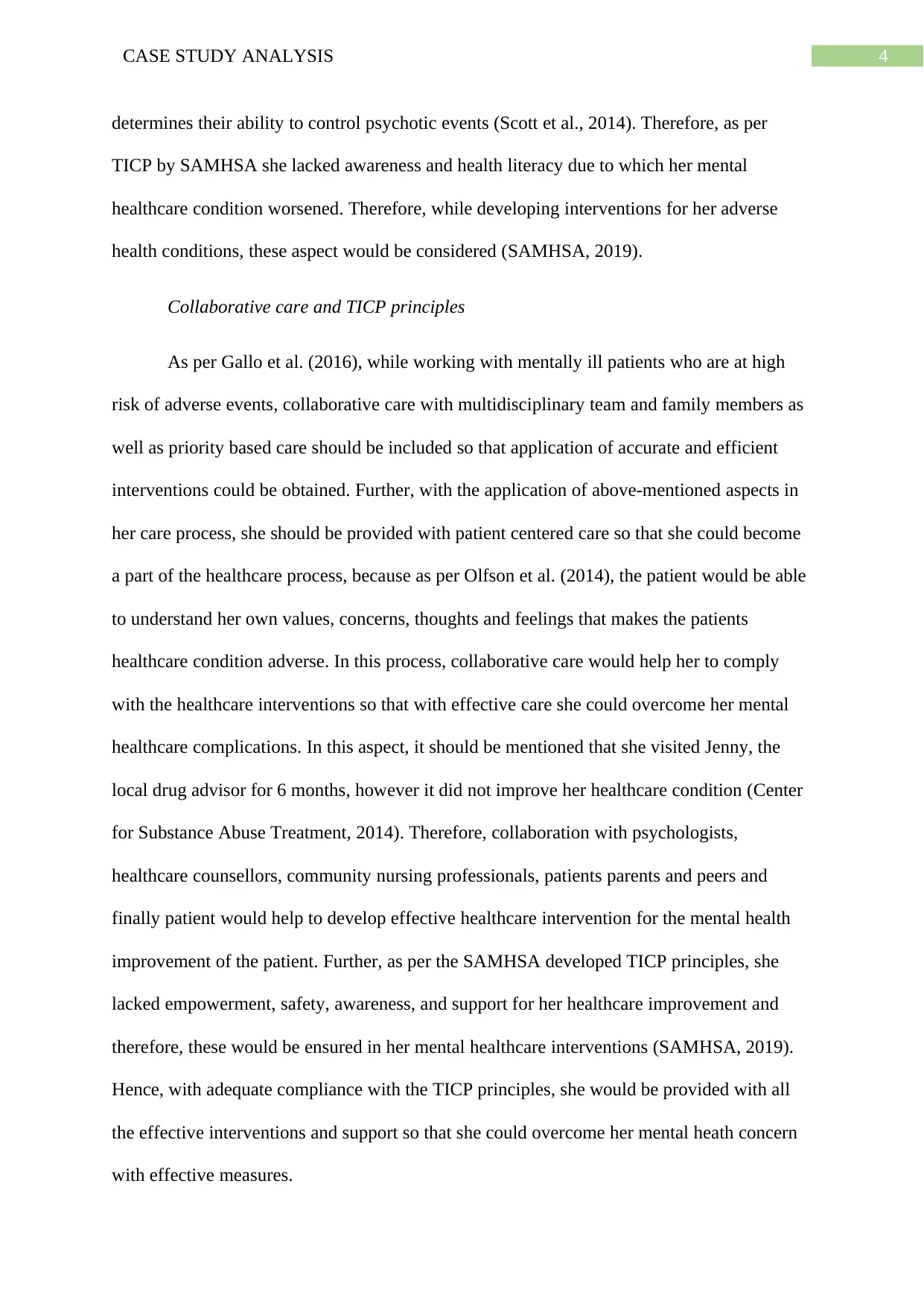
4CASE STUDY ANALYSIS
determines their ability to control psychotic events (Scott et al., 2014). Therefore, as per
TICP by SAMHSA she lacked awareness and health literacy due to which her mental
healthcare condition worsened. Therefore, while developing interventions for her adverse
health conditions, these aspect would be considered (SAMHSA, 2019).
Collaborative care and TICP principles
As per Gallo et al. (2016), while working with mentally ill patients who are at high
risk of adverse events, collaborative care with multidisciplinary team and family members as
well as priority based care should be included so that application of accurate and efficient
interventions could be obtained. Further, with the application of above-mentioned aspects in
her care process, she should be provided with patient centered care so that she could become
a part of the healthcare process, because as per Olfson et al. (2014), the patient would be able
to understand her own values, concerns, thoughts and feelings that makes the patients
healthcare condition adverse. In this process, collaborative care would help her to comply
with the healthcare interventions so that with effective care she could overcome her mental
healthcare complications. In this aspect, it should be mentioned that she visited Jenny, the
local drug advisor for 6 months, however it did not improve her healthcare condition (Center
for Substance Abuse Treatment, 2014). Therefore, collaboration with psychologists,
healthcare counsellors, community nursing professionals, patients parents and peers and
finally patient would help to develop effective healthcare intervention for the mental health
improvement of the patient. Further, as per the SAMHSA developed TICP principles, she
lacked empowerment, safety, awareness, and support for her healthcare improvement and
therefore, these would be ensured in her mental healthcare interventions (SAMHSA, 2019).
Hence, with adequate compliance with the TICP principles, she would be provided with all
the effective interventions and support so that she could overcome her mental heath concern
with effective measures.
determines their ability to control psychotic events (Scott et al., 2014). Therefore, as per
TICP by SAMHSA she lacked awareness and health literacy due to which her mental
healthcare condition worsened. Therefore, while developing interventions for her adverse
health conditions, these aspect would be considered (SAMHSA, 2019).
Collaborative care and TICP principles
As per Gallo et al. (2016), while working with mentally ill patients who are at high
risk of adverse events, collaborative care with multidisciplinary team and family members as
well as priority based care should be included so that application of accurate and efficient
interventions could be obtained. Further, with the application of above-mentioned aspects in
her care process, she should be provided with patient centered care so that she could become
a part of the healthcare process, because as per Olfson et al. (2014), the patient would be able
to understand her own values, concerns, thoughts and feelings that makes the patients
healthcare condition adverse. In this process, collaborative care would help her to comply
with the healthcare interventions so that with effective care she could overcome her mental
healthcare complications. In this aspect, it should be mentioned that she visited Jenny, the
local drug advisor for 6 months, however it did not improve her healthcare condition (Center
for Substance Abuse Treatment, 2014). Therefore, collaboration with psychologists,
healthcare counsellors, community nursing professionals, patients parents and peers and
finally patient would help to develop effective healthcare intervention for the mental health
improvement of the patient. Further, as per the SAMHSA developed TICP principles, she
lacked empowerment, safety, awareness, and support for her healthcare improvement and
therefore, these would be ensured in her mental healthcare interventions (SAMHSA, 2019).
Hence, with adequate compliance with the TICP principles, she would be provided with all
the effective interventions and support so that she could overcome her mental heath concern
with effective measures.
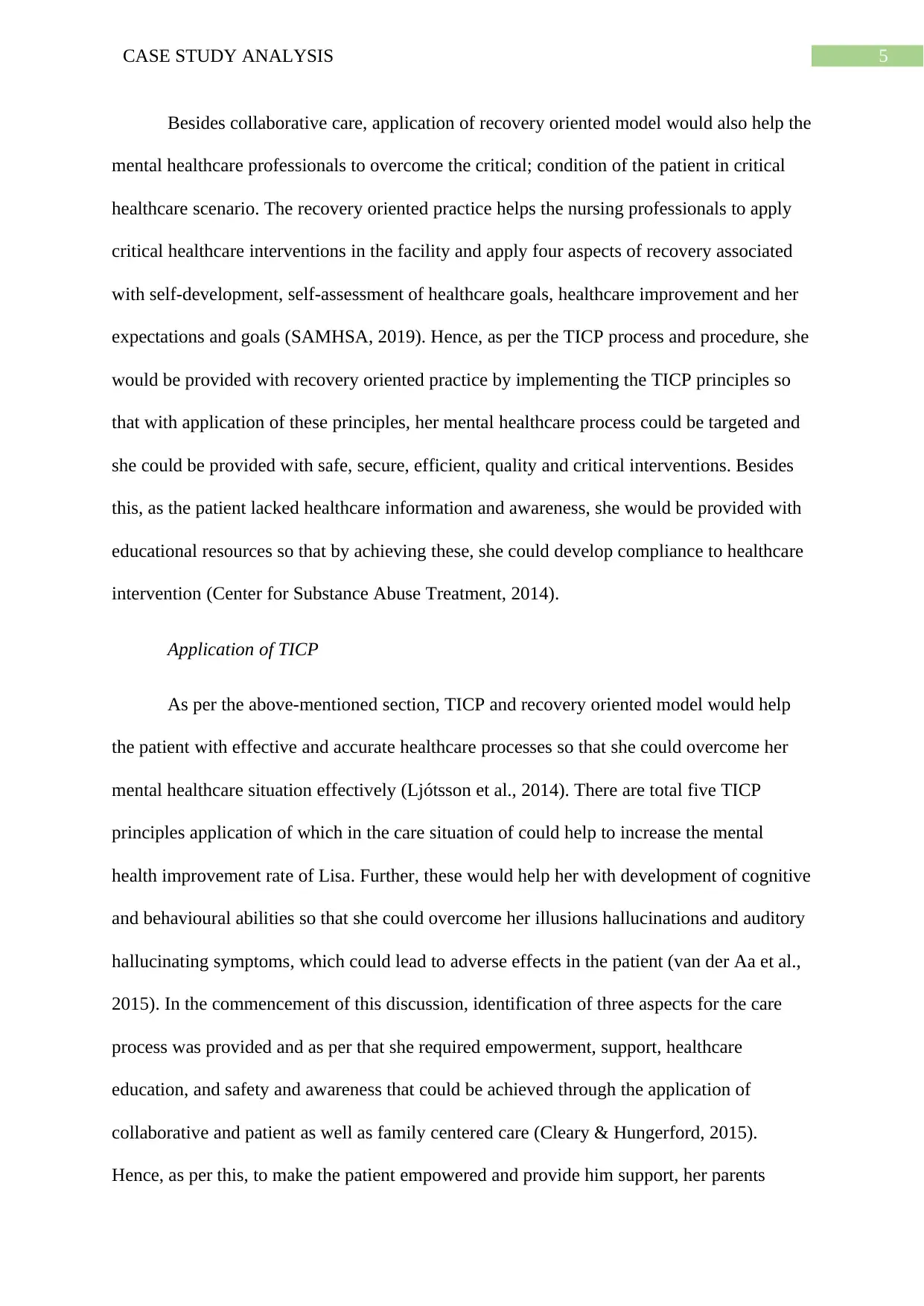
5CASE STUDY ANALYSIS
Besides collaborative care, application of recovery oriented model would also help the
mental healthcare professionals to overcome the critical; condition of the patient in critical
healthcare scenario. The recovery oriented practice helps the nursing professionals to apply
critical healthcare interventions in the facility and apply four aspects of recovery associated
with self-development, self-assessment of healthcare goals, healthcare improvement and her
expectations and goals (SAMHSA, 2019). Hence, as per the TICP process and procedure, she
would be provided with recovery oriented practice by implementing the TICP principles so
that with application of these principles, her mental healthcare process could be targeted and
she could be provided with safe, secure, efficient, quality and critical interventions. Besides
this, as the patient lacked healthcare information and awareness, she would be provided with
educational resources so that by achieving these, she could develop compliance to healthcare
intervention (Center for Substance Abuse Treatment, 2014).
Application of TICP
As per the above-mentioned section, TICP and recovery oriented model would help
the patient with effective and accurate healthcare processes so that she could overcome her
mental healthcare situation effectively (Ljótsson et al., 2014). There are total five TICP
principles application of which in the care situation of could help to increase the mental
health improvement rate of Lisa. Further, these would help her with development of cognitive
and behavioural abilities so that she could overcome her illusions hallucinations and auditory
hallucinating symptoms, which could lead to adverse effects in the patient (van der Aa et al.,
2015). In the commencement of this discussion, identification of three aspects for the care
process was provided and as per that she required empowerment, support, healthcare
education, and safety and awareness that could be achieved through the application of
collaborative and patient as well as family centered care (Cleary & Hungerford, 2015).
Hence, as per this, to make the patient empowered and provide him support, her parents
Besides collaborative care, application of recovery oriented model would also help the
mental healthcare professionals to overcome the critical; condition of the patient in critical
healthcare scenario. The recovery oriented practice helps the nursing professionals to apply
critical healthcare interventions in the facility and apply four aspects of recovery associated
with self-development, self-assessment of healthcare goals, healthcare improvement and her
expectations and goals (SAMHSA, 2019). Hence, as per the TICP process and procedure, she
would be provided with recovery oriented practice by implementing the TICP principles so
that with application of these principles, her mental healthcare process could be targeted and
she could be provided with safe, secure, efficient, quality and critical interventions. Besides
this, as the patient lacked healthcare information and awareness, she would be provided with
educational resources so that by achieving these, she could develop compliance to healthcare
intervention (Center for Substance Abuse Treatment, 2014).
Application of TICP
As per the above-mentioned section, TICP and recovery oriented model would help
the patient with effective and accurate healthcare processes so that she could overcome her
mental healthcare situation effectively (Ljótsson et al., 2014). There are total five TICP
principles application of which in the care situation of could help to increase the mental
health improvement rate of Lisa. Further, these would help her with development of cognitive
and behavioural abilities so that she could overcome her illusions hallucinations and auditory
hallucinating symptoms, which could lead to adverse effects in the patient (van der Aa et al.,
2015). In the commencement of this discussion, identification of three aspects for the care
process was provided and as per that she required empowerment, support, healthcare
education, and safety and awareness that could be achieved through the application of
collaborative and patient as well as family centered care (Cleary & Hungerford, 2015).
Hence, as per this, to make the patient empowered and provide him support, her parents
⊘ This is a preview!⊘
Do you want full access?
Subscribe today to unlock all pages.

Trusted by 1+ million students worldwide
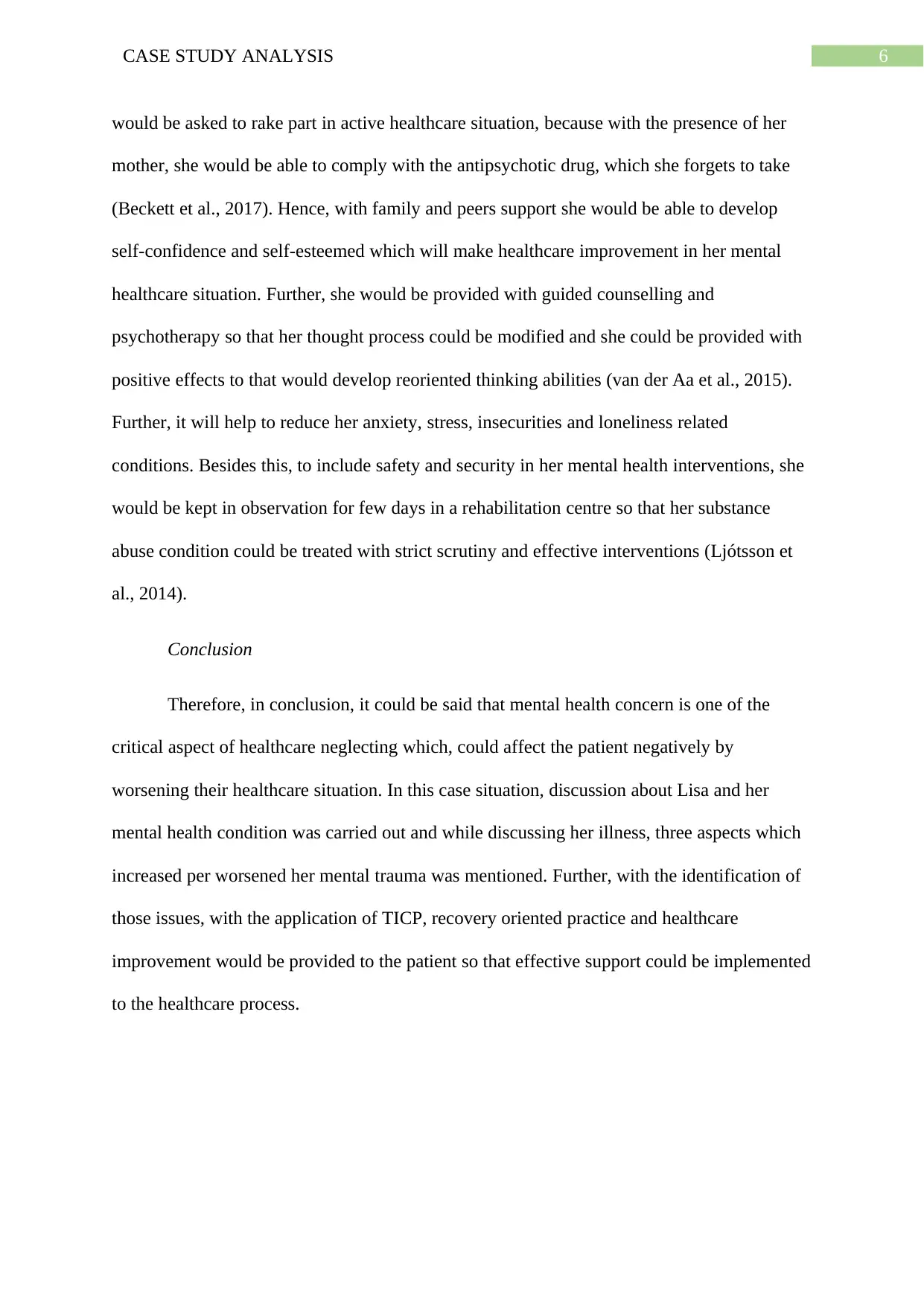
6CASE STUDY ANALYSIS
would be asked to rake part in active healthcare situation, because with the presence of her
mother, she would be able to comply with the antipsychotic drug, which she forgets to take
(Beckett et al., 2017). Hence, with family and peers support she would be able to develop
self-confidence and self-esteemed which will make healthcare improvement in her mental
healthcare situation. Further, she would be provided with guided counselling and
psychotherapy so that her thought process could be modified and she could be provided with
positive effects to that would develop reoriented thinking abilities (van der Aa et al., 2015).
Further, it will help to reduce her anxiety, stress, insecurities and loneliness related
conditions. Besides this, to include safety and security in her mental health interventions, she
would be kept in observation for few days in a rehabilitation centre so that her substance
abuse condition could be treated with strict scrutiny and effective interventions (Ljótsson et
al., 2014).
Conclusion
Therefore, in conclusion, it could be said that mental health concern is one of the
critical aspect of healthcare neglecting which, could affect the patient negatively by
worsening their healthcare situation. In this case situation, discussion about Lisa and her
mental health condition was carried out and while discussing her illness, three aspects which
increased per worsened her mental trauma was mentioned. Further, with the identification of
those issues, with the application of TICP, recovery oriented practice and healthcare
improvement would be provided to the patient so that effective support could be implemented
to the healthcare process.
would be asked to rake part in active healthcare situation, because with the presence of her
mother, she would be able to comply with the antipsychotic drug, which she forgets to take
(Beckett et al., 2017). Hence, with family and peers support she would be able to develop
self-confidence and self-esteemed which will make healthcare improvement in her mental
healthcare situation. Further, she would be provided with guided counselling and
psychotherapy so that her thought process could be modified and she could be provided with
positive effects to that would develop reoriented thinking abilities (van der Aa et al., 2015).
Further, it will help to reduce her anxiety, stress, insecurities and loneliness related
conditions. Besides this, to include safety and security in her mental health interventions, she
would be kept in observation for few days in a rehabilitation centre so that her substance
abuse condition could be treated with strict scrutiny and effective interventions (Ljótsson et
al., 2014).
Conclusion
Therefore, in conclusion, it could be said that mental health concern is one of the
critical aspect of healthcare neglecting which, could affect the patient negatively by
worsening their healthcare situation. In this case situation, discussion about Lisa and her
mental health condition was carried out and while discussing her illness, three aspects which
increased per worsened her mental trauma was mentioned. Further, with the identification of
those issues, with the application of TICP, recovery oriented practice and healthcare
improvement would be provided to the patient so that effective support could be implemented
to the healthcare process.
Paraphrase This Document
Need a fresh take? Get an instant paraphrase of this document with our AI Paraphraser
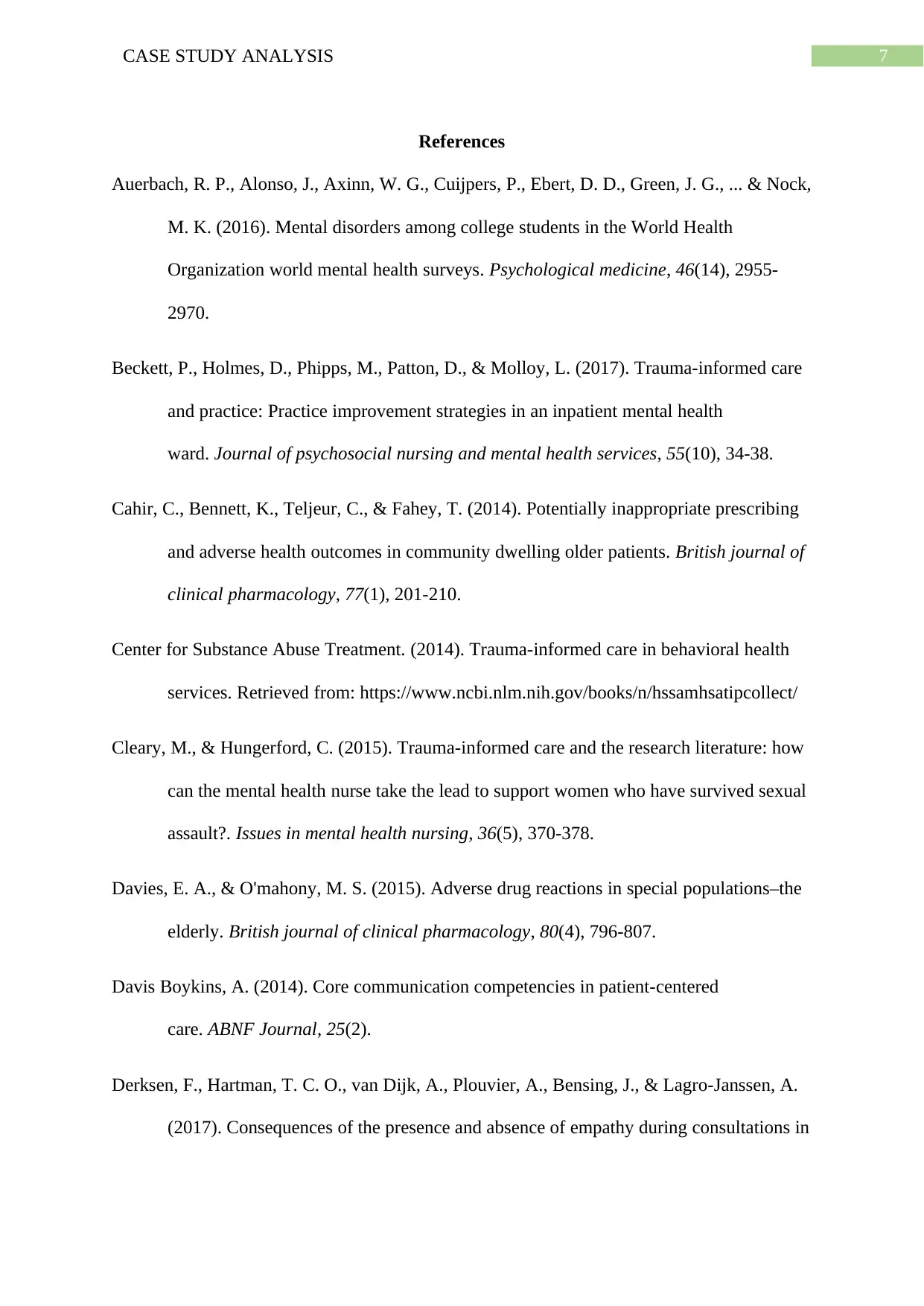
7CASE STUDY ANALYSIS
References
Auerbach, R. P., Alonso, J., Axinn, W. G., Cuijpers, P., Ebert, D. D., Green, J. G., ... & Nock,
M. K. (2016). Mental disorders among college students in the World Health
Organization world mental health surveys. Psychological medicine, 46(14), 2955-
2970.
Beckett, P., Holmes, D., Phipps, M., Patton, D., & Molloy, L. (2017). Trauma-informed care
and practice: Practice improvement strategies in an inpatient mental health
ward. Journal of psychosocial nursing and mental health services, 55(10), 34-38.
Cahir, C., Bennett, K., Teljeur, C., & Fahey, T. (2014). Potentially inappropriate prescribing
and adverse health outcomes in community dwelling older patients. British journal of
clinical pharmacology, 77(1), 201-210.
Center for Substance Abuse Treatment. (2014). Trauma-informed care in behavioral health
services. Retrieved from: https://www.ncbi.nlm.nih.gov/books/n/hssamhsatipcollect/
Cleary, M., & Hungerford, C. (2015). Trauma-informed care and the research literature: how
can the mental health nurse take the lead to support women who have survived sexual
assault?. Issues in mental health nursing, 36(5), 370-378.
Davies, E. A., & O'mahony, M. S. (2015). Adverse drug reactions in special populations–the
elderly. British journal of clinical pharmacology, 80(4), 796-807.
Davis Boykins, A. (2014). Core communication competencies in patient-centered
care. ABNF Journal, 25(2).
Derksen, F., Hartman, T. C. O., van Dijk, A., Plouvier, A., Bensing, J., & Lagro-Janssen, A.
(2017). Consequences of the presence and absence of empathy during consultations in
References
Auerbach, R. P., Alonso, J., Axinn, W. G., Cuijpers, P., Ebert, D. D., Green, J. G., ... & Nock,
M. K. (2016). Mental disorders among college students in the World Health
Organization world mental health surveys. Psychological medicine, 46(14), 2955-
2970.
Beckett, P., Holmes, D., Phipps, M., Patton, D., & Molloy, L. (2017). Trauma-informed care
and practice: Practice improvement strategies in an inpatient mental health
ward. Journal of psychosocial nursing and mental health services, 55(10), 34-38.
Cahir, C., Bennett, K., Teljeur, C., & Fahey, T. (2014). Potentially inappropriate prescribing
and adverse health outcomes in community dwelling older patients. British journal of
clinical pharmacology, 77(1), 201-210.
Center for Substance Abuse Treatment. (2014). Trauma-informed care in behavioral health
services. Retrieved from: https://www.ncbi.nlm.nih.gov/books/n/hssamhsatipcollect/
Cleary, M., & Hungerford, C. (2015). Trauma-informed care and the research literature: how
can the mental health nurse take the lead to support women who have survived sexual
assault?. Issues in mental health nursing, 36(5), 370-378.
Davies, E. A., & O'mahony, M. S. (2015). Adverse drug reactions in special populations–the
elderly. British journal of clinical pharmacology, 80(4), 796-807.
Davis Boykins, A. (2014). Core communication competencies in patient-centered
care. ABNF Journal, 25(2).
Derksen, F., Hartman, T. C. O., van Dijk, A., Plouvier, A., Bensing, J., & Lagro-Janssen, A.
(2017). Consequences of the presence and absence of empathy during consultations in
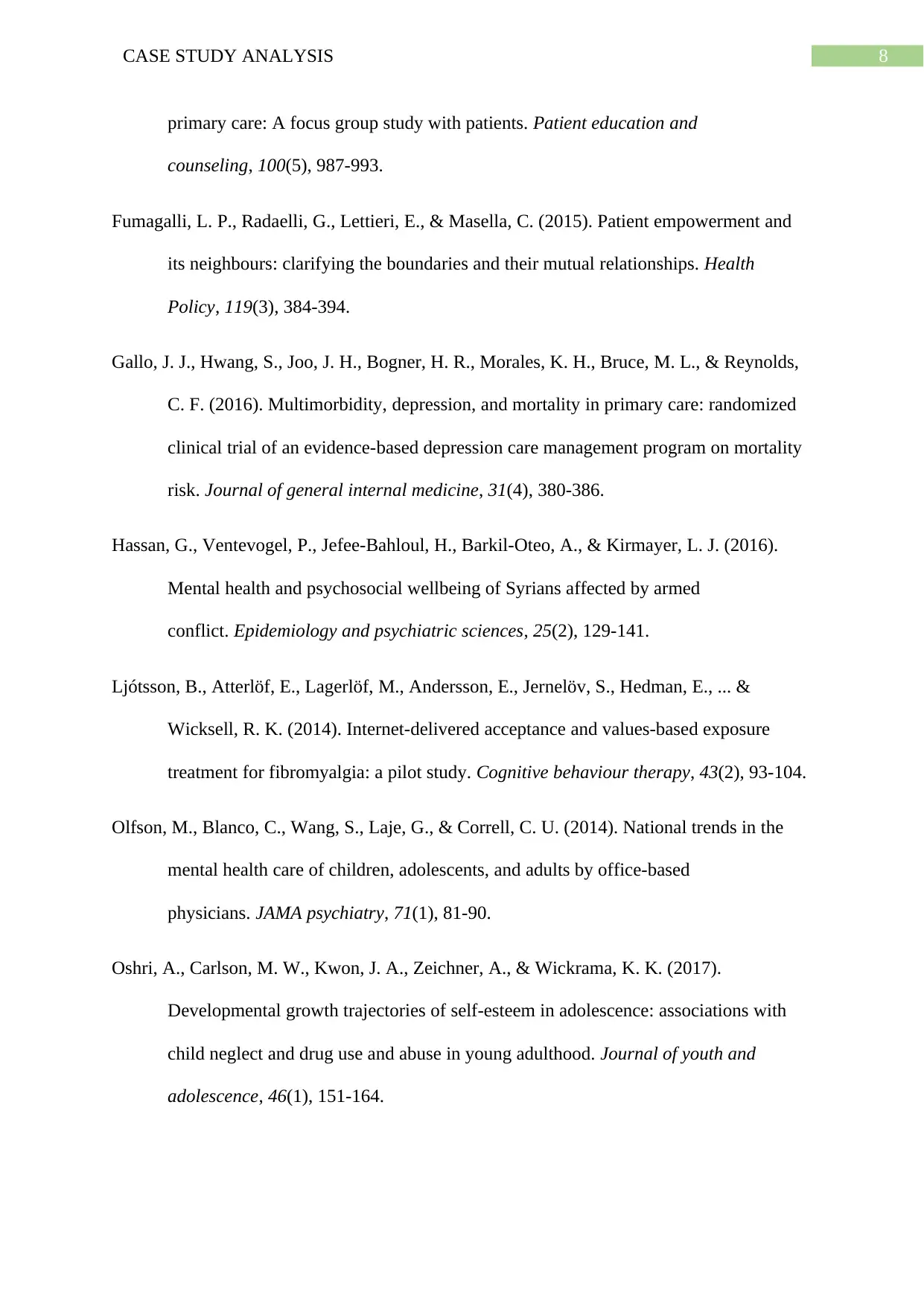
8CASE STUDY ANALYSIS
primary care: A focus group study with patients. Patient education and
counseling, 100(5), 987-993.
Fumagalli, L. P., Radaelli, G., Lettieri, E., & Masella, C. (2015). Patient empowerment and
its neighbours: clarifying the boundaries and their mutual relationships. Health
Policy, 119(3), 384-394.
Gallo, J. J., Hwang, S., Joo, J. H., Bogner, H. R., Morales, K. H., Bruce, M. L., & Reynolds,
C. F. (2016). Multimorbidity, depression, and mortality in primary care: randomized
clinical trial of an evidence-based depression care management program on mortality
risk. Journal of general internal medicine, 31(4), 380-386.
Hassan, G., Ventevogel, P., Jefee-Bahloul, H., Barkil-Oteo, A., & Kirmayer, L. J. (2016).
Mental health and psychosocial wellbeing of Syrians affected by armed
conflict. Epidemiology and psychiatric sciences, 25(2), 129-141.
Ljótsson, B., Atterlöf, E., Lagerlöf, M., Andersson, E., Jernelöv, S., Hedman, E., ... &
Wicksell, R. K. (2014). Internet-delivered acceptance and values-based exposure
treatment for fibromyalgia: a pilot study. Cognitive behaviour therapy, 43(2), 93-104.
Olfson, M., Blanco, C., Wang, S., Laje, G., & Correll, C. U. (2014). National trends in the
mental health care of children, adolescents, and adults by office-based
physicians. JAMA psychiatry, 71(1), 81-90.
Oshri, A., Carlson, M. W., Kwon, J. A., Zeichner, A., & Wickrama, K. K. (2017).
Developmental growth trajectories of self-esteem in adolescence: associations with
child neglect and drug use and abuse in young adulthood. Journal of youth and
adolescence, 46(1), 151-164.
primary care: A focus group study with patients. Patient education and
counseling, 100(5), 987-993.
Fumagalli, L. P., Radaelli, G., Lettieri, E., & Masella, C. (2015). Patient empowerment and
its neighbours: clarifying the boundaries and their mutual relationships. Health
Policy, 119(3), 384-394.
Gallo, J. J., Hwang, S., Joo, J. H., Bogner, H. R., Morales, K. H., Bruce, M. L., & Reynolds,
C. F. (2016). Multimorbidity, depression, and mortality in primary care: randomized
clinical trial of an evidence-based depression care management program on mortality
risk. Journal of general internal medicine, 31(4), 380-386.
Hassan, G., Ventevogel, P., Jefee-Bahloul, H., Barkil-Oteo, A., & Kirmayer, L. J. (2016).
Mental health and psychosocial wellbeing of Syrians affected by armed
conflict. Epidemiology and psychiatric sciences, 25(2), 129-141.
Ljótsson, B., Atterlöf, E., Lagerlöf, M., Andersson, E., Jernelöv, S., Hedman, E., ... &
Wicksell, R. K. (2014). Internet-delivered acceptance and values-based exposure
treatment for fibromyalgia: a pilot study. Cognitive behaviour therapy, 43(2), 93-104.
Olfson, M., Blanco, C., Wang, S., Laje, G., & Correll, C. U. (2014). National trends in the
mental health care of children, adolescents, and adults by office-based
physicians. JAMA psychiatry, 71(1), 81-90.
Oshri, A., Carlson, M. W., Kwon, J. A., Zeichner, A., & Wickrama, K. K. (2017).
Developmental growth trajectories of self-esteem in adolescence: associations with
child neglect and drug use and abuse in young adulthood. Journal of youth and
adolescence, 46(1), 151-164.
⊘ This is a preview!⊘
Do you want full access?
Subscribe today to unlock all pages.

Trusted by 1+ million students worldwide
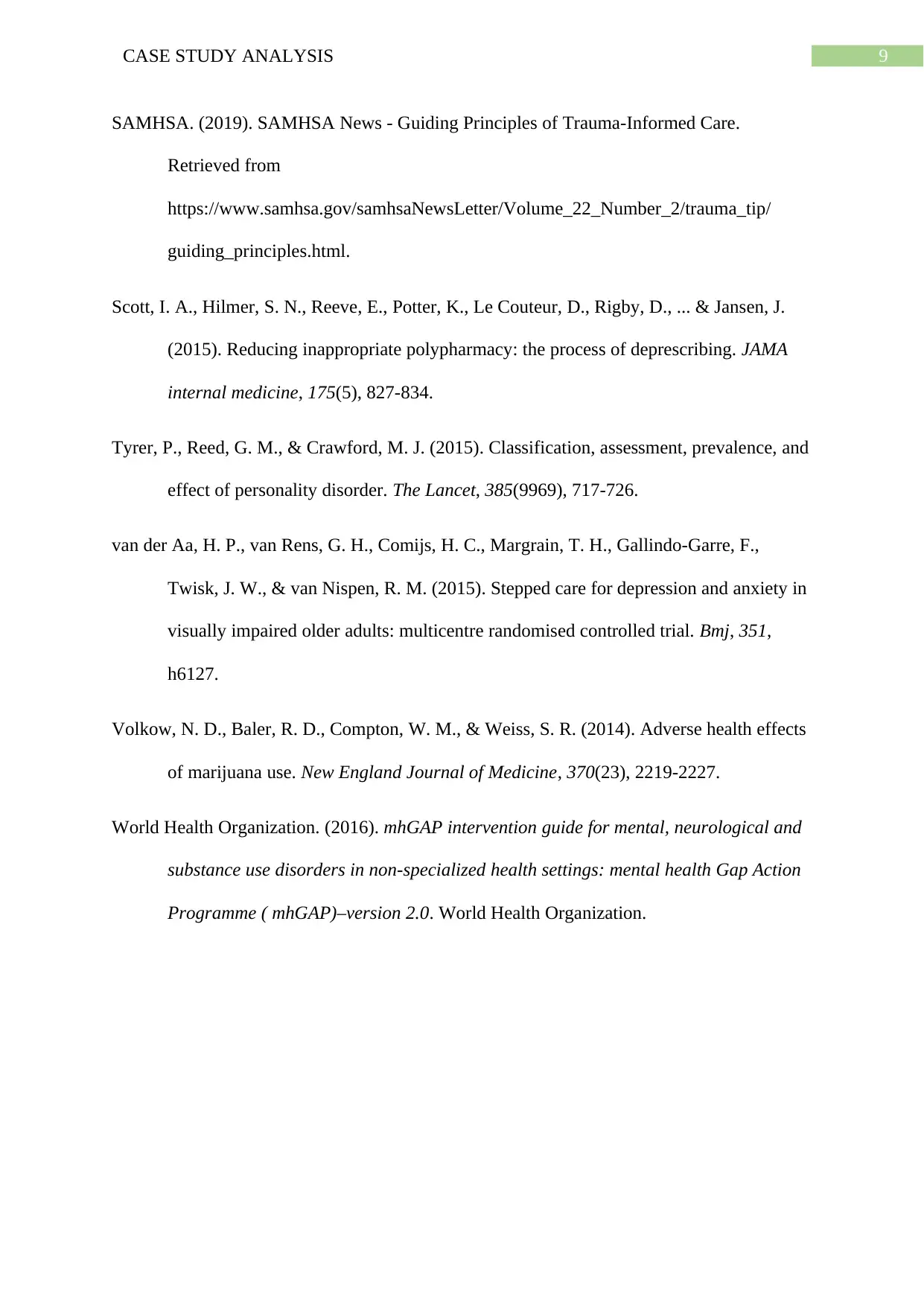
9CASE STUDY ANALYSIS
SAMHSA. (2019). SAMHSA News - Guiding Principles of Trauma-Informed Care.
Retrieved from
https://www.samhsa.gov/samhsaNewsLetter/Volume_22_Number_2/trauma_tip/
guiding_principles.html.
Scott, I. A., Hilmer, S. N., Reeve, E., Potter, K., Le Couteur, D., Rigby, D., ... & Jansen, J.
(2015). Reducing inappropriate polypharmacy: the process of deprescribing. JAMA
internal medicine, 175(5), 827-834.
Tyrer, P., Reed, G. M., & Crawford, M. J. (2015). Classification, assessment, prevalence, and
effect of personality disorder. The Lancet, 385(9969), 717-726.
van der Aa, H. P., van Rens, G. H., Comijs, H. C., Margrain, T. H., Gallindo-Garre, F.,
Twisk, J. W., & van Nispen, R. M. (2015). Stepped care for depression and anxiety in
visually impaired older adults: multicentre randomised controlled trial. Bmj, 351,
h6127.
Volkow, N. D., Baler, R. D., Compton, W. M., & Weiss, S. R. (2014). Adverse health effects
of marijuana use. New England Journal of Medicine, 370(23), 2219-2227.
World Health Organization. (2016). mhGAP intervention guide for mental, neurological and
substance use disorders in non-specialized health settings: mental health Gap Action
Programme ( mhGAP)–version 2.0. World Health Organization.
SAMHSA. (2019). SAMHSA News - Guiding Principles of Trauma-Informed Care.
Retrieved from
https://www.samhsa.gov/samhsaNewsLetter/Volume_22_Number_2/trauma_tip/
guiding_principles.html.
Scott, I. A., Hilmer, S. N., Reeve, E., Potter, K., Le Couteur, D., Rigby, D., ... & Jansen, J.
(2015). Reducing inappropriate polypharmacy: the process of deprescribing. JAMA
internal medicine, 175(5), 827-834.
Tyrer, P., Reed, G. M., & Crawford, M. J. (2015). Classification, assessment, prevalence, and
effect of personality disorder. The Lancet, 385(9969), 717-726.
van der Aa, H. P., van Rens, G. H., Comijs, H. C., Margrain, T. H., Gallindo-Garre, F.,
Twisk, J. W., & van Nispen, R. M. (2015). Stepped care for depression and anxiety in
visually impaired older adults: multicentre randomised controlled trial. Bmj, 351,
h6127.
Volkow, N. D., Baler, R. D., Compton, W. M., & Weiss, S. R. (2014). Adverse health effects
of marijuana use. New England Journal of Medicine, 370(23), 2219-2227.
World Health Organization. (2016). mhGAP intervention guide for mental, neurological and
substance use disorders in non-specialized health settings: mental health Gap Action
Programme ( mhGAP)–version 2.0. World Health Organization.
1 out of 10
Related Documents
Your All-in-One AI-Powered Toolkit for Academic Success.
+13062052269
info@desklib.com
Available 24*7 on WhatsApp / Email
![[object Object]](/_next/static/media/star-bottom.7253800d.svg)
Unlock your academic potential
Copyright © 2020–2026 A2Z Services. All Rights Reserved. Developed and managed by ZUCOL.





